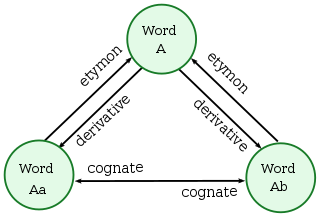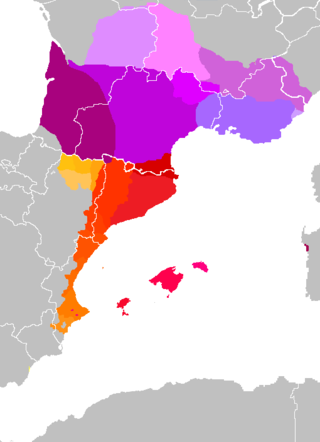
In historical linguistics, cognates or lexical cognates are sets of words that have been inherited in direct descent from an etymological ancestor in a common parent language. Because language change can have radical effects on both the sound and the meaning of a word, cognates may not be obvious, and it often takes rigorous study of historical sources and the application of the comparative method to establish whether lexemes are cognate. Cognates are distinguished from loanwords, where a word has been borrowed from another language.

Occitan, also known as lenga d'òc by its native speakers, sometimes also referred to as Provençal, is a Romance language spoken in Southern France, Monaco, Italy's Occitan Valleys, as well as Spain's Val d'Aran in Catalonia; collectively, these regions are sometimes referred to as Occitania. It is also spoken in Calabria in a linguistic enclave of Cosenza area. Some include Catalan in Occitan, as the distance between this language and some Occitan dialects is similar to the distance between different Occitan dialects. Catalan was considered a dialect of Occitan until the end of the 19th century and still today remains its closest relative.

The Romance languages, also known as the Latin or Neo-Latin languages, are the languages that are directly descended from Vulgar Latin. They are the only extant subgroup of the Italic branch of the Indo-European language family.

Vulgar Latin, also known as Popular or Colloquial Latin, is the range of non-formal registers of Latin spoken from the Late Roman Republic onward. Vulgar Latin as a term is both controversial and imprecise. Spoken Latin existed for a long time and in many places. Scholars have differed in opinion as to the extent of the differences, and whether Vulgar Latin was in some sense a different language. This was developed as a theory in the nineteenth century by Raynouard. At its extreme, the theory suggested that the written register formed an elite language distinct from common speech, but this is now rejected.
The Iberian Romance, Ibero-Romance or sometimes Iberian languages are a group of Romance languages that developed on the Iberian Peninsula, an area consisting primarily of Spain, Portugal, Gibraltar, Andorra and southern France. They are today more commonly separated into West Iberian and Occitano-Romance language groups.

The Gallo-Romance branch of the Romance languages includes in the narrowest sense the langues d'oïl and Franco-Provençal. However, other definitions are far broader and variously encompass the Occitan or Occitano-Romance, Gallo-Italic or Rhaeto-Romance languages.
In etymology, two or more words in the same language are called doublets or etymological twins or twinlings when they have different phonological forms but the same etymological root. Often, but not always, the words entered the language through different routes. Given that the kinship between words that have the same root and the same meaning is fairly obvious, the term is mostly used to characterize pairs of words that have diverged at least somewhat in meaning. For example, English pyre and fire are doublets with merely associated meanings despite both descending ultimately from the same Proto-Indo-European (PIE) word *péh₂ur.
This article describes the different ways of forming the plural forms of nouns and adjectives in the Romance languages, and discusses various hypotheses about how these systems emerged historically from the declension patterns of Vulgar Latin.
There have been many languages spoken in the Iberian Peninsula.

The internal classification of the Romance languages is a complex and sometimes controversial topic which may not have one single answer. Several classifications have been proposed, based on different criteria.

The language known today as Spanish is derived from spoken Latin, which was brought to the Iberian Peninsula by the Romans after their occupation of the peninsula that started in the late 3rd century BC. Today it is the world's 4th most widely spoken language, after English, Mandarin Chinese and Hindi. Influenced by the peninsular hegemony of Al-Andalus in the early middle ages, Hispano-Romance varieties borrowed substantial lexicon from Arabic. Upon the southward territorial expansion of the Kingdom of Castile, Hispano-Romance norms associated to this polity displaced both Arabic and the Mozarabic romance varieties in the conquered territories, even though the resulting speech also assimilated features from the latter in the process. The first standard written norm of Spanish was brought forward in the 13th century by Alfonso X the Wise, probably drawing from the speech of the upper classes of Toledo. Features associated with the Castilian patterns of Hispano-Romance also spread west and east to the kingdoms of León and Aragón for the rest of the middle ages, owing to the political prestige achieved by the Kingdom of Castile in the peninsular context and to the lesser literary development of their vernacular norms. From the 1560s onward the standard written form followed Madrid's.

The Occitano-Romance or Gallo-Narbonnese, or rarely East Iberian, is a branch of the Romance language group that encompasses the Catalan/Valencian and Occitan languages spoken in parts of southern France and northeastern Spain.

Western Romance languages are one of the two subdivisions of a proposed subdivision of the Romance languages based on the La Spezia–Rimini Line. They include the Gallo-Romance and Iberian Romance branches. Gallo-Italic may also be included. The subdivision is based mainly on the use of the "s" for pluralization, the weakening of some consonants and the pronunciation of “Soft C” as /t͡s/ rather than /t͡ʃ/ as in Italian and Romanian.
The Reichenau Glossary is a collection of Latin glosses likely compiled in the 8th century in northern France to assist local clergy in understanding certain words or expressions found in the Vulgate Bible.
As a member of the dialect continuum of Romance languages, Catalan displays linguistic features similar to those of its closest neighbors. The following features represent in some cases unique changes in the evolution of Catalan from Vulgar Latin; other features are common in other Romance-speaking areas.
The Latin numerals are the words used to denote numbers within the Latin language. They are essentially based on their Proto-Indo-European ancestors, and the Latin cardinal numbers are largely sustained in the Romance languages. In Antiquity and during the Middle Ages they were usually represented by Roman numerals in writing.
Romance linguistics is the scientific study of the Romance languages.
Proto-Romance is the comparatively reconstructed ancestor of the Romance languages. It is effectively Late Latin viewed retrospectively through its descendants.